In the world of baking, precision is often the key to success. But what happens when you're all set to whip up a batch of your favorite muffins, only to realize that you're fresh out of baking powder? Fear not; you don't need to postpone your baking plan. Whether you're out of this leavening agent or looking for a suitable alternative due to dietary restrictions, we've got you covered.
In this guide, we'll share the best baking powder substitutes you may have right in your kitchen, providing practical solutions to keep your culinary creations rising to the occasion. Whether it's a matter of necessity or curiosity, understanding these substitutes can be a game-changer in your baking endeavors.
The 10 Baking Powder Substitutes To Elevate Your Baking Game
Baking Soda And Cream Of Tartar
Baking soda (sodium bicarbonate) and cream of tartar (or other acidic ingredient) combined can be one of the best baking powder substitutes, offering the desired leavening effect and versatility in various recipes. Baking soda, an alkaline compound, reacts with the acid present in cream of tartar when exposed to moisture and heat. This reaction produces carbon dioxide gas, leading baked goods rise and resulting in a lighter texture. The cream of tartar ensures that the baking soda's leavening action is properly activated.
To substitute for one teaspoon of baking powder, blend 1/4 teaspoon of baking soda with 1/2 teaspoon of cream of tartar. This substitute is ideal for recipes that require precise leavening and where the additional acidity from the cream of tartar won't disrupt the flavor profile.
It's versatile and dependable as a baking powder substitute, making it a suitable choice when you've run out of baking powder or prefer a DIY approach to your baking endeavors. Whether you're whipping up biscuits, banana cookies, or quick bread, baking soda and cream of tartar offer a tried-and-true solution for achieving that perfect rise and texture in your culinary creations.
Plain Yogurt
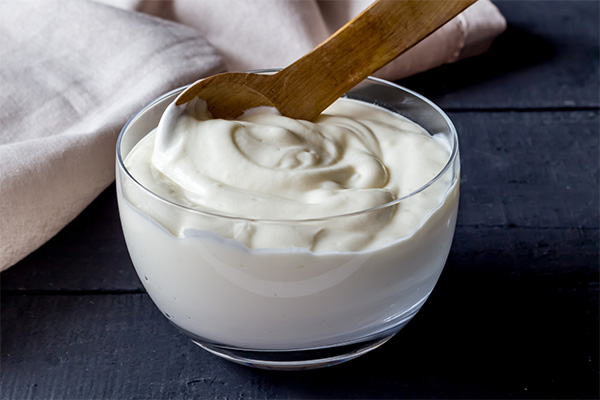
Yogurt is a viable baking powder substitute because of its acidity and moisture content, which can activate baking soda and produce the leavening effect needed in baking. This substitution not only aids in the rising process but also imparts moisture, resulting in a tender crumb.
To replace baking powder, you can combine 1/4 teaspoon of baking soda with 1/2 cup of yogurt for every one teaspoon of baking powder. This combination is particularly beneficial in moisture-dependent recipes, such as cakes and quick breads.
Buttermilk

Buttermilk is an effective substitute for baking powder due to its acidic properties. It reacts with baking soda to create leavening in baked goods. The chemical reaction generates carbon dioxide, causing the dough or batter to expand and resulting in a texture that is both soft and fluffy.
For each teaspoon of baking powder you need to replace, mix together 1/4 teaspoon of baking soda with 1/2 cup of buttermilk. This substitute is especially advantageous when your recipe calls for the tangy flavor of buttermilk or when you want to add a subtle dairy richness to your baked goods. Using this substitute when your recipe already includes an acidic component is essential, ensuring that the leavening process is properly initiated.
Sour Cream
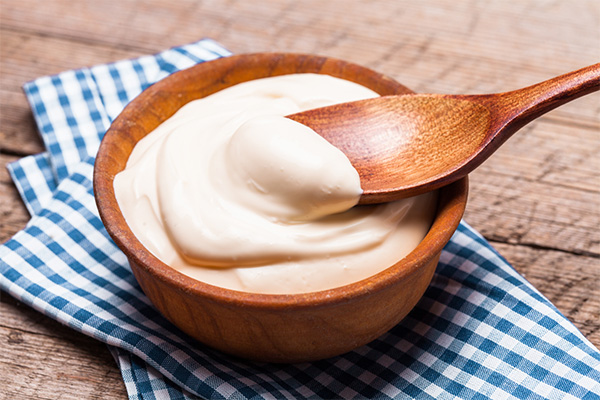
Sour cream, with its natural acidity and creamy texture, can be used as a substitute for baking powder in recipes. Its acidic component activates baking soda, creating leavening and contributing to a soft, tender crumb in baked goods.
When a recipe calls for baking powder, use 1/4 teaspoon of baking soda mixed with about 1/2 cup of sour cream to replace one teaspoon of baking powder. This substitution works well in recipes like cakes, muffins, and bread, where the added moisture and fat from sour cream enhance flavor and texture, making the baked items richer and more tender.
Club Soda
Club soda is a surprisingly effective and unique substitute for baking powder in recipes requiring leavening. When you find yourself without baking powder, you can replace the liquid component in your recipe with an equal amount of club soda. This implies that if your recipe requires 1 cup of liquid, such as milk or water, you can substitute it with 1 cup of club soda.
The carbonation in club soda introduces tiny bubbles into your batter or dough, contributing to a lighter and airier texture in baked goods. While it may not produce the exact leavening effect as baking powder, club soda's effervescence can add a pleasant lift to pancakes, waffles, and some quick bread recipes. It's particularly useful in situations where a subtle carbonated flavor is welcome, providing a unique twist to your culinary creations.
Whipped Egg Whites
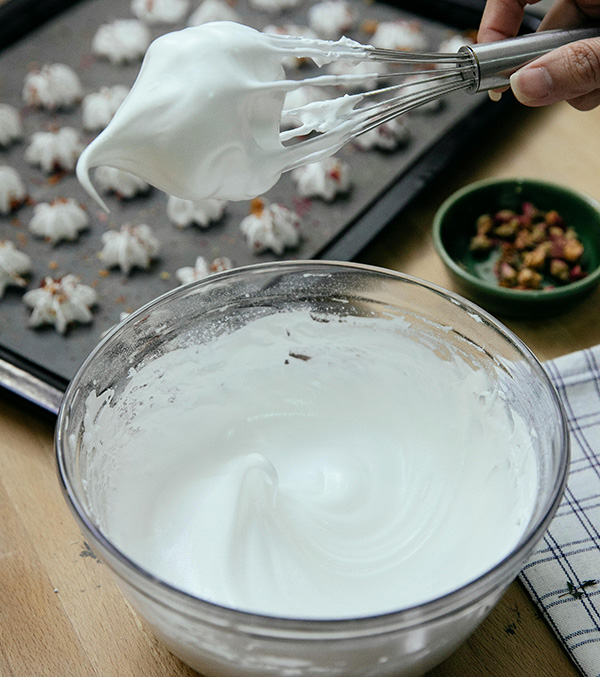
Whipped egg whites are a remarkable substitute for baking powder when you want to achieve a light and airy texture in your baked goods. This substitute is most effective in recipes where leavening is not critical and a delicate, fluffy result is desired.
To substitute whipped egg whites for baking powder, beat them until stiff peaks form and gently fold them into your batter or dough. The incorporation of air during the whipping process expands when exposed to heat, creating a lift that results in a soft and airy texture.
While whipped egg whites may not offer the same leavening power as baking powder, they excel in recipes like soufflés, meringues, and some cakes, where a delicate and airy structure is the goal. This substitute is best utilized in recipes that can accommodate the addition of egg whites without altering their intended texture and consistency.
Self-Rising Flour
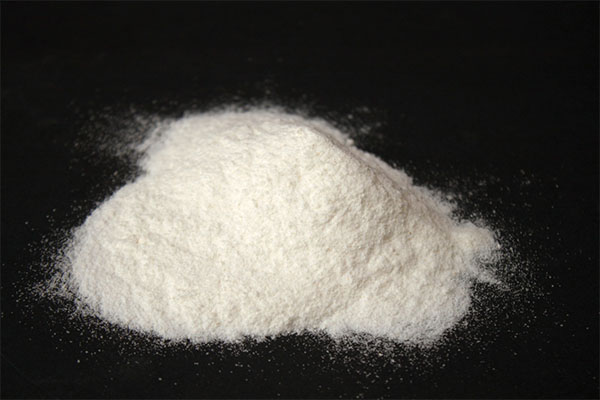
Using self-rising flour to replace all-purpose flour eliminates the need for extra baking powder when leavening is required in your recipes. This flour blend already contains the necessary leavening agent, making it a simple solution when you find yourself without baking powder.
To substitute baking powder with self-rising flour, replace the all-purpose flour in your recipe with an equal amount of self-rising flour and omit the baking powder from your ingredients.
The beauty of self-rising flour lies in its simplicity and efficiency. It streamlines the leavening process by already incorporating baking powder, eliminating the need for separate measurements and ensuring consistent results. This substitute is perfect for recipes like biscuits, scones, and some quick breads, where a light and fluffy texture is desired without the hassle of additional leavening agents.
Molasses And Baking Soda
Molasses and baking soda together form an intriguing and effective baking powder substitute, offering leavening properties and a distinct flavor profile. To utilize this substitute, combine 1/4 teaspoon of baking soda with 1/2 cup of molasses to replace one teaspoon of baking powder in your recipe.
The chemistry behind this combination is fascinating. When exposed to heat and moisture, the acid in molasses reacts with the alkaline baking soda, creating carbon dioxide gas. This gas contributes to the desired rise and texture in baked goods.
Beyond leavening, molasses introduces a rich, caramel-like flavor and dark color to your dishes, making it a standout choice in recipes like gingerbread cookies and certain breads. Molasses and baking soda prove to be a flavorful and effective substitute for baking powder when you seek to infuse a unique taste and an extra layer of complexity into your culinary creations while maintaining leavening action.
Baking Soda And Lemon Juice
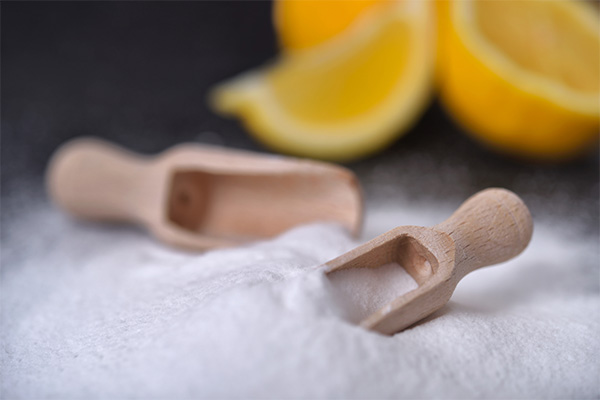
Baking soda and lemon juice form a dynamic baking powder substitute, offering both leavening power and a touch of tangy flavor. Mix 1/4 teaspoon of baking soda with 1/2 teaspoon of lemon juice to substitute for one teaspoon of baking powder.
The secret behind this substitute lies in the chemical reaction between the alkaline baking soda and the acid in lemon juice. When these two ingredients interact with moisture and heat in your recipe, they produce carbon dioxide gas, creating bubbles that result in the desired rise and texture in your baked goods. The addition of lemon juice, which is high in citric acid, introduces a subtle citrusy tang that can enhance the flavor of various dishes, making it particularly suitable for recipes where a hint of acidity is welcome.
Sour milk
Sour milk, often considered a baking inconvenience, can actually be a valuable baking powder substitute. Its acidic nature activates the leavening process when combined with baking soda.
To substitute a teaspoon of baking powder, use a blend of 1/4 teaspoon of baking soda with 1/2 cup of sour milk. This substitution shines in baked goods like cakes, muffins, and pancakes, where the mild acidity of sour milk tenderizes the dough, enhancing texture and flavor. The lactic acid in sour milk breaks down gluten strands, yielding a softer, moister crumb.
How To Make Homemade Baking Powder
Making your own baking powder can be used in recipes just like commercial baking powder, providing the necessary leavening for your baked goods. Creating homemade baking powder is a straightforward process that requires just two common kitchen ingredients: cream of tartar and baking soda. Here's a step-by-step guide on how to make homemade baking powder:
Ingredients
1 Part cream of tartar
2 Parts baking soda
Instructions
- In a mixing bowl, add the measured amount of cream of tartar and baking soda.
- Use a whisk or a fork to blend the two ingredients thoroughly. The crucial step is to guarantee an even distribution of the cream of tartar and baking soda.
- You can sift the homemade baking powder mixture through a fine-mesh sieve or sifter for an extra level of uniformity. This step helps break up any lumps and guarantees an even distribution.
- Transfer your homemade baking powder into an airtight container, ensuring it is well-sealed to prevent moisture from compromising its effectiveness.
- To prevent confusion, label the container with the date of preparation and its contents.
